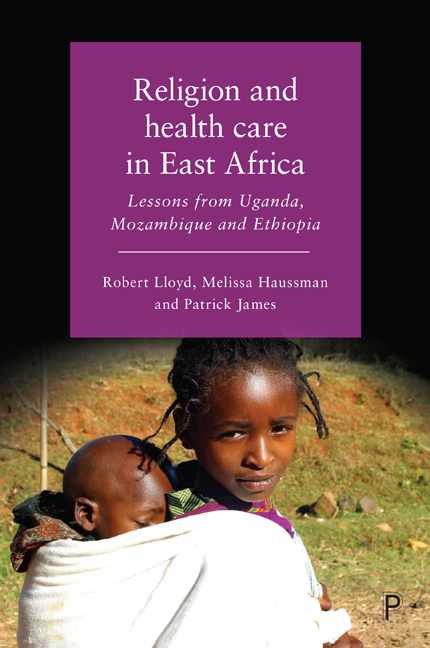7 - Conclusion
Published online by Cambridge University Press: 27 April 2022
Summary
Overview
With a focus on three states in Eastern Africa, this study has examined the role of religion in health-care processes and outcomes. The results can be summarized as religion matters.
Results affirm the frame of reference offered by the Social Determinants of Health with regard to processes. Religion is significant for processes concerning the provision and consumption of health care. Faith-based entities are important, even essential, in health care for Uganda, Mozambique, and Ethiopia. Moreover, health-seeking behavior is impacted upon by a holistic mindset in which physical and mental health are intertwined. Africans thus pursue health care in a rational way, given their world view, with openness to and even preference for faith-based provision under circumstances in which government efforts fall short of basic needs. A review of health outcomes, centered around the Millennium Development Goals, reveals progress across the board. Attention to women's health, however, reveals nuances in the generally upward-shifting values for the Millennium Development Goals. Religious and traditional belief systems play at least some role in holding back outcomes for women relative to men, and exacerbating problems frequently connected with the inherently contested area of reproductive health.
These findings are in line with the rigorous but relatively limited academic literature, reviewed in Chapter 2, on health care in Africa. Health-seeking behavior in the three states included here confirms a holistic way of thinking that blends the physical and spiritual together. Faith-based providers, in line with such preferences and the inadequate performance by governments, represent a significant component of health. Interviews and other data on Uganda, Mozambique, and Ethiopia do nothing to change the sense that any comparative advantage for faith-based providers of health care remains open to question. These entities tend to offer the same services as government-run facilities. Quite certain after a review of the evidence is the focus by faith-based health-care providers on HIV/AIDS and service to the poor. In sum, the previous foundation of research on the role of religion in health for Africa is confirmed by the case studies of Uganda, Mozambique, and Ethiopia carried out here.
This chapter unfolds in two further sections. The first section focuses on implications for concept formation and interdisciplinary fields.
- Type
- Chapter
- Information
- Religion and Health Care in East AfricaLessons from Uganda, Mozambique and Ethiopia, pp. 189 - 194Publisher: Bristol University PressPrint publication year: 2019



